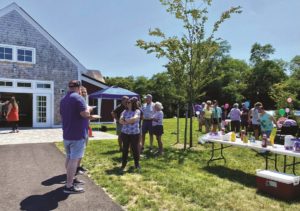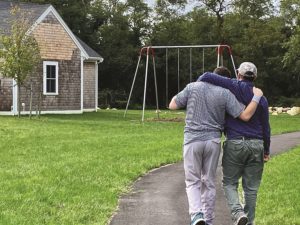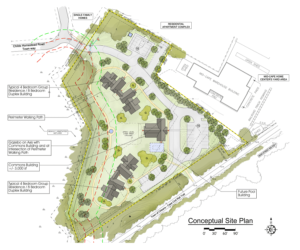ORLEANS — Psychotherapists Lauren and Bob Jones finally saw the results of 11 years of hard work. The couple’s dream of creating a home for their son Alexander and other adults with autism became a reality in January 2020.

Two years later, the $7 million residential community their nonprofit has created is operating at only half its capacity because they cannot find enough people to work there.
Cape Cod Village sits on four acres next to the Cape Cod Rail Trail. It was designed to provide 24-hour care for 16 adult residents, but currently only two of its four houses are open, with seven residents on campus. There are 12 people on staff.
“I get many phone calls from families eager to have their loved one join the community,” said Lauren Jones. But to be fully operational, she said, 40 more staff members would be needed.
Cape Cod Village is essential, Jones explained, because services for people with autism “drop off a cliff” once those who need them reach age 22. The idea of a live-in setting for these adults started in the Joneses’ living room. “We gathered parents,” she said. “All of us were worried about what was going to happen to our kids when we’re no longer here to advocate for them.”
The Joneses created a nonprofit to build the community the group envisioned, and the project received private donations as well as funding from the federal government, the state, Barnstable County, and seven Cape Cod towns — nearly a million dollars in community preservation funds from all four Outer Cape towns, plus Orleans, Brewster, and Chatham.
Placement at Cape Cod Village requires a diagnosis of autism spectrum disorder, which opens the way for support through the state’s Dept. of Developmental Services (DDS) and for Social Security Disability Income.

In addition to the four houses, the Village includes a walking trail and a 3,500-square-foot resource center with offices, recreation rooms, and a basketball court. “The hope was to have cookouts, yoga classes, art parties, drumming circles,” Jones said. Because group homes tend to be isolated, she said, their aim was to integrate people with autism into the larger community.
In March 2020, just after their first few residents moved in, community activity ground to a halt because of the pandemic. The loss of staff was an unexpected consequence.
The profession’s relatively low pay and the high cost of housing here have long made finding caregivers on the Cape difficult. But the pandemic led many caregivers into roles caring for children who were suddenly being schooled at home or for elders whose caregivers were in the same situation.
Two years later, “we’re still in this extensive workforce crisis,” Jones said. There’s a long waitlist, she said, that includes several families who have been working on the project since the beginning and whose adult children need more care than they feel they can give, especially as they age.
Cape Cod Village is not the only disability services organization experiencing a labor crisis. Nationally, the vacancy rate for full-time direct support positions increased roughly 45 percent from 2019 to 2020, according to the annual “Case for Inclusion” report published by United Cerebral Palsy and the ANCOR Foundation.
Cape Abilities, a nonprofit that provides education, counseling, and employment support for people with disabilities, will close its Eastham center on June 30. As the Independent reported in April, it was unable to attract enough staff to stay open here and will be consolidating services in Hyannis.

More than 300 people, including state Rep. Sarah Peake and Sen. Julian Cyr, gathered on Zoom to hear the Cape Abilities announcement and discuss the effects of the employee shortage on Cape organizations, including the pressure lack of staff puts on those who remain in caregiving jobs. Better wages for caregivers, whose DDS-supported salaries are about $17 per hour, and more housing options were repeatedly called for in that meeting. “We need your voices and stories on the floor of town meeting, at planning and zoning board meetings,” said Cyr.
“The most vulnerable populations in our society are children, the elderly, and the disabled,” said Jones. “Yet the people who provide these people intimate care are paid so poorly. Very minimally, wages need to be $20 an hour, but I would want at least $24 or $25 an hour.”
To find qualified caregivers, Cape Cod Village has worked with an agency called the North East Education Developmental Support Center (NEEDS Center), which trains and hires staff for people with developmental disabilities. Based in Andover, NEEDS works with many group homes across the state, Jones said.
But even if qualified caregivers are found, Jones said, and even if salaries can be supplemented, “I don’t know where the people who are going to be caretaking everyone living here are going to live. There are a lot of housing initiatives for affordable housing all over the Cape, but they can’t come soon enough.”



